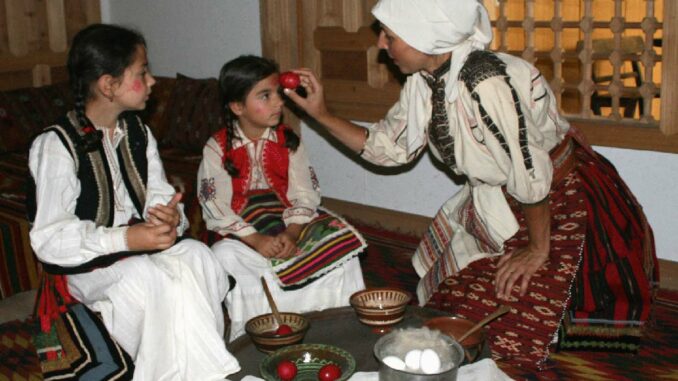
Introduction
In Bulgaria, the arrival of Easter marks a time of jubilation, unity, and deep-rooted traditions. This sacred holiday, celebrated with a unique blend of religious rituals and cultural customs, reflects the rich tapestry of Bulgaria’s history and the enduring spirit of its people. Join us on an immersive journey into the heart of Bulgarian Easter celebrations, exploring the profound significance, festive preparations, and the diverse rituals that make this holiday a cherished and vibrant part of the Bulgarian cultural calendar.
Part 1: The Spiritual Essence of Bulgarian Easter
1.1 Orthodox Christianity:
- Easter in Bulgaria is primarily celebrated by the Orthodox Christian community, representing the majority of the population. The Orthodox Church plays a central role in the Easter festivities, infusing the celebrations with deep spiritual meaning.
1.2 Lenten Period:
- The Easter season begins with the Great Lent, a period of 40 days of fasting, prayer, and repentance. This time of reflection prepares believers for the joyous celebration of Christ’s resurrection.
1.3 Midnight Liturgy:
- The pinnacle of Easter celebrations is the Midnight Liturgy on Holy Saturday night. Churches across Bulgaria are adorned with candles, flowers, and elaborate decorations as the faithful gather to commemorate the Resurrection.
Part 2: Preparing for Easter: Customs and Traditions
2.1 Colorful Eggs:
- One of the most iconic symbols of Bulgarian Easter is the dyed egg. Families engage in the tradition of dyeing eggs in vibrant colors, symbolizing the joy and renewal associated with Christ’s resurrection.
2.2 Easter Bread (Kozunak):
- Kozunak, a sweet and braided Easter bread, holds a central place in Bulgarian Easter traditions. Families bake this delicious bread, often with a red-dyed egg nestled in its folds, symbolizing the blood of Christ.
2.3 Easter Lamb:
- Roasted lamb is a traditional Easter dish, symbolizing the Lamb of God. Families gather for festive meals, where lamb takes center stage, along with an array of other traditional dishes.
2.4 Red Eggs:
- Red eggs hold special significance during Bulgarian Easter. Families exchange red eggs as a symbol of the triumph of life over death, and it is customary to crack eggs together, with the one left uncracked believed to bring good luck.
2.5 Easter Sunday Traditions:
- Easter Sunday is a day of joyous gatherings and shared meals. Families and friends come together to celebrate, exchange Easter greetings, and partake in the festive atmosphere.
Part 3: Unique Bulgarian Easter Rituals
3.1 Easter Resurrection Ritual:
- At midnight on Holy Saturday, the Resurrection of Christ is celebrated with a symbolic procession. The congregation carries lit candles, and the priest proclaims the joyful news of Christ’s resurrection.
3.2 Water Blessing (Kresna Voda):
- On Easter Sunday, Bulgarians participate in the tradition of “Kresna Voda,” where water is blessed to symbolize purity, cleansing, and the renewal of life.
3.3 Easter Monday: Lazarovden:
- Easter Monday, known as “Lazarovden,” holds a special significance. On this day, young girls known as “lazarki” dress in traditional attire and visit homes, singing songs and wishing prosperity.
3.4 Easter Games:
- Easter in Bulgaria is also a time for playful traditions. One such game involves cracking eggs, with the last unbroken egg believed to bring good fortune.
Part 4: Easter Across Bulgaria’s Regions
4.1 Plovdiv:
- Plovdiv, one of Bulgaria’s oldest cities, celebrates Easter with vibrant processions, cultural events, and traditional foods.
4.2 Veliko Tarnovo:
- In Veliko Tarnovo, the medieval capital of Bulgaria, Easter is celebrated with a unique blend of historical reenactments and religious ceremonies.
4.3 Rila Monastery:
- The Rila Monastery, a UNESCO World Heritage site, hosts elaborate Easter celebrations, drawing pilgrims and visitors from near and far.
Part 5: Easter’s Contemporary Significance
5.1 Family Reunions:
- Easter is a time for families to come together, with many Bulgarians traveling to their hometowns to celebrate with loved ones.
5.2 Community Involvement:
- Churches, schools, and community centers play a vital role in organizing Easter events, fostering a sense of community and shared joy.
5.3 Cultural Festivals:
- Across Bulgaria, Easter is marked by cultural festivals, art exhibitions, and performances that showcase the country’s rich cultural heritage.
Conclusion
Easter in Bulgaria is a celebration that seamlessly weaves together centuries-old traditions, spiritual significance, and the warmth of familial bonds. As the Resurrection is joyously proclaimed in churches across the country, Bulgarians embark on a journey of shared meals, festive rituals, and cultural expressions that honor their history and faith. Whether in the ancient streets of Plovdiv, the majestic Rila Monastery, or the picturesque town of Veliko Tarnovo, the spirit of Easter in Bulgaria transcends geographic boundaries, creating a vibrant tapestry that reflects the enduring beauty of this cherished celebration. May the echoes of Easter joy resonate across Bulgaria, uniting hearts and souls in the spirit of renewal and hope.